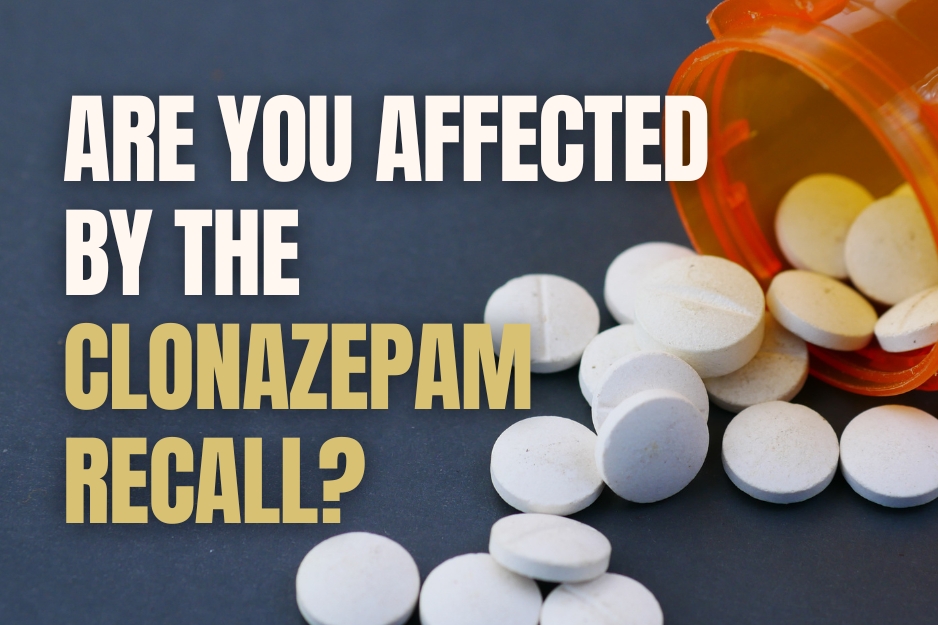The FDA Food and Drug Administration has issued a recall for 16 lots of Clonazepam manufactured by Endo, Inc., following a critical labeling error. The product safety recall is hoping to prevent medication errors.
According to the safety alert, the strength listed on the product cartons (0.125 mg) did not match the actual strength of the tablets inside (0.25 mg).
This discrepancy means the tablets were 100% stronger than what patients were led to believe. The wrong Clonazepam dose poses significant health and safety risks for individuals taking the medication.
Clonazepam Recall Lawsuits: What You Need to Know Now
In an official statement, Endo shifted the blame for this mishap onto a “third-party packager”:
“The product … is being recalled due to mislabeling where an incorrect strength appears on the cartons … due to an error at a third-party packager.”
But Endo hired this company. And the product belongs to Endo. Therefore, this is their responsibility to bear, as it puts thousands of people at risk of overdosing on its drug.
Given the recall, the FDA agrees. And with that safety warning, The Yost Legal Group has taken action to represent people harmed by the potentially deadly mislabeling.
If you or a loved one has suffered an adverse reaction due to the mislabeling of Clonazepam, The Yost Legal Group is here to help.
FDA Recalls Clonazepam Drug for Safety Concerns
With over 30 years of experience in representing victims of accidents caused by negligence, our defective drug attorneys will provide compassionate and experienced support as you seek the justice you deserve.
Pharmaceutical errors are unacceptable, and we believe in holding Big Pharma accountable for its mistakes.
Contact The Yost Legal Group product liability lawyers today for a free consultation. Call 1-800-967-8529 to speak with our caring and experienced legal team.
Clonazepam: The Generic Name for Klonopin
The brand name for Clonazepam is Klonopin, which is more widely recognized by the general public. However, it is essential to note that any potential litigation against Endo, Inc. regarding the mislabeling of its product applies only to Clonazepam, not to other products.
Klonopin is a brand name owned by a different company. Clonazepam is the generic name. There are also several other manufacturers of Clonazepam, but they are not relevant to this potential litigation.
We are only focusing on Endo’s version of the drug, as that is, to this point, the only version that was distributed with the potentially harmful mislabeling.
What Is Clonazepam?
Clonazepam is a generic medication belonging to the benzodiazepine class of depressant drugs. That is a fair amount of pharmaceutical jargon and terminology, so let’s break it down piece by piece.
- Depressants: You are probably familiar with depressant drugs. As a slang term, they are often referred to in casual conversations as “downers.” These types of drugs affect the brain’s activity.
They slow neurotransmission levels and decrease electrical activity in the brain. Depressants also inhibit an individual’s ability to feel arousal and stimulation.
While this might sound negative, this reduction in brain activity is precisely why depressant drugs can be effective when used correctly by the discretion of a medical professional to relieve disorders and symptoms such as various anxiety disorders, depression, insomnia, obsessive-compulsive disorder, and seizures.
Alcohol, benzodiazepines, and cannabis are some of the most common types of depressant drugs.
- Benzodiazepines: As mentioned above, benzodiazepines, known colloquially as “benzos,” are a class of depressant drugs. This type of drug derives its name from its chemical compound, which is a fusion of a benzene ring and a diazepine ring.
Medically, benzodiazepines are used to treat anxiety and panic disorders, insomnia, and seizures.
Common types of benzodiazepines include alprazolam (Xanax®), clonazepam (Klonopin®), and diazepam (Valium®).
Mislabeling Medication Could Affect Your Safety
Clonazepam and benzodiazepines, in general, are often used to treat anxiety disorders, bipolar mania, and seizures as their structural formulae target certain receptors in the brain (GABAA) to produce a calming effect, thus reducing anxiety, preventing seizures, and promoting relaxation.
People living with conditions such as anxiety, bipolar disorders, or epilepsy depend upon their medicine to help them get through their days. Their medications are vital to their mental and physical health.
Now, with Endo’s labeling error, which the company itself has referred to as “possibly life-threatening” in the FDA safety warning, some patients may lose confidence or trust in the medication that helps them manage their condition.
If you or someone you care about has been affected by a defective drug or Endo’s Clonazepam due to a labeling error, you may be eligible for compensation.
Contact the skilled defective drug attorneys at The Yost Legal Group for a free, confidential consultation.
Protecting your health and well-being is important, so don’t wait. Call 1-800-967-8529 now to learn more.
Side Effects of Clonazepam
Even when taking a benzodiazepine such as Clonazepam in the appropriate doses and dosage, there is still the potential for adverse effects because of the change to the brain’s chemical composition.
The most common side effects of Clonazepam include the following:
- Depression
- Dizziness
- Drowsiness
- Fatigue
- Forgetfulness
- Lack of coordination
Know Your Rights After Endo’s Labeling Error
If one has taken a dose that is 100% higher than what a doctor has prescribed because the labeling on the packaging lists an incorrect strength, these side effects become much more harmful and potentially deadly.
Overdosing on benzodiazepines like Clonazepam or combining them with opioid medications can lead to profound sedation that is hard to wake from, respiratory depression that can lead to suffocation, coma, and, in the absolute worst case, death.
Endo must be held responsible for its mistake, even if it plans to shift the blame to the third-party packager that printed and applied the labels. After all, it was Endo who hired the third-party packager in the first place.
Furthermore, as previously stated, there are several manufacturers of Clonazepam. Endo is not alone in the production of this benzodiazepine.
However, Endo is the only company to have its version of Clonazepam recalled by the FDA. And if people have been harmed, we will help them hold the company to account.
Patient Risks for Taking Mislabeled Clonazepam Medication
A two-fold overdose of Clonazepam poses serious risks for children and adults. Potential adverse effects include:
– Significant sedation
– Dizziness
– Ataxia
– Confusion
There is also a considerable likelihood of severe and potentially life-threatening respiratory depression. This risk increases for individuals with:
– Pulmonary disease
– Those prescribed near-maximal dosing
– Those taking other medications that may contribute to respiratory depression
Your Health May Be at Risk After a Drug Recall
To check if your Clonazepam is affected by a recall, follow these steps:
- Check your packaging
Look for the lot number on the carton of your Clonazepam product.
- Compare the lot number.
Visit the FDA website for the complete list of recalled lot numbers. Or check the list below. Endo USA, Inc. is recalling certain Clonazepam Orally Disintegrating Tablets due to potential mislabeling of the carton strength.
- Contact your healthcare provider or pharmacy.
If your lot number matches one on the recall list, reach out to your healthcare provider or the pharmacy that dispensed the medication for next steps.
Taking these precautions is essential for ensuring the safety and appropriateness of your medication.
Lots Affected by the Clonazepam Recall
Potential Product Description / NDC Number
Lot Number Expiry Date
Clonazepam ODT, USP (C-IV) 2mg / 49884-310-02
550176501 Feb 2027
550176601 Feb 2027
Clonazepam ODT, USP (C-IV) 0.125mg / 49884-306-02
550174101 Jan 2027
Clonazepam ODT, USP (C-IV) 0.25mg / 49884-307-02
550142801 Aug 2026
550142901 Aug 2026
550143001 Aug 2026
550143101 Aug 2026
550143201 Aug 2026
550143301 Aug 2026
550143401 Aug 2026
550147201 Aug 2026
550147401 Aug 2026
Clonazepam ODT, USP (C-IV) 1mg / 49884-309-02
550145201 Aug 2026
550175901 Feb 2027
550176001 Feb 2027
550176201 Feb 2027
According to ClinCalc.com, Clonazepam was the 57th most prescribed drug in the United States in 2022. In 2022, more than 11.5 million prescriptions of Clonazepam were distributed to nearly 2 million patients.
Fight Back Against Medication Risks, Protect Your Rights
This mislabeling potentially puts millions of people at risk. While it is true that Endo has acknowledged the error and acknowledged the risk (as evidenced by their “possibly life-threatening” quote), its claim that there have been no reports of adverse events rings hollow.
Defective Drug Lawyers Protecting Your Rights
The Yost Legal Group is representing clients harmed by Clonazepam overdose from mislabeled packaging. If you have experienced serious side effects or if a loved one has died from an overdose due to this mislabeling error, call us for help.
We handle cases involving medication errors, FDA pharmaceutical recalls, and recalled drugs. If a prescription medication like Clonazepam tablets caused you harm, contact our drug recall lawyers.
If a defective drug has harmed you or a loved one, contact The Yost Legal Group today. Our experienced defective drug lawyers will immediately begin working on your case. We will help you understand your rights and seek the compensation and justice to which you are entitled.
Every consultation is free, and there are no fees unless we win your case.
FDA Recall List – Drug Recall FDA – Clonazepam Use – Prescription Drug – Drug Interactions



